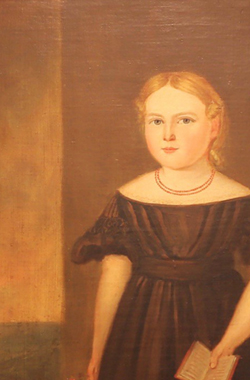Synopsis
I am ancient now and half blind and mostly deaf and stove up with rheumatism so bad I can hardly hold a cup. But still my memory is good and my brain as sharp as when I was just a girl out on the farm. And so I have decided to write down everything I can rightly remember so my grandchildren and great grandchildren will better know me and the life I lived and the country where I lived it.
I do not want to leave the job to others
to paint my portrait.
And so begins Annie’s War, Thomas William Simpson’s breathtaking historical novel based on his family’s experiences before, during, and after the American Civil War.
May 1, 1838. A small family farm in central Pennsylvania. A tremendous storm blows up. Thunder and lightning and torrents of rain. Ray’s Creek overflows its banks. In the midst of the tumult Annie Leigh Ralston is born.
Over the next several years Annie’s mother gives birth to three more daughters and four sons. Some survive the trials and tribulations of the age; some do not.
Typhus, cholera, measles, the pox, strep, snake bites, tetanus, and many other maladies stand in the way of Annie and her siblings reaching adulthood. Farm life in the first half of the nineteenth century did not abide the sick, the weak, or the lazy.
July 3, 1863. Gettysburg, Pennsylvania. Annie’s younger brother, a private in the 125th Pennsylvania Volunteers, is shot through the stomach during Pickett’s Charge and left to die on the field of battle. Annie travels by train and wagon and on foot until she reaches her brother’s side. Using homespun remedies and a love of Biblical proportions, Annie nurses the dying boy back to life.
Annie’s War is the chronicle of one woman’s life from 1838 until 1923. But on a larger stage it is the story of 19th century American women stepping out of the shadow of suppression into the dawn of a new age.
Today we have far too little understanding of the severe and repressive lives our great grandmothers led. Annie’s War, a riveting and highly personal narrative, portrays one woman’s struggle for knowledge, respect, and self-determination.
Thomas William Simpson, the author of such diverse novels as This Way Madness Lies, The Hancock Boys, and The Affair has blended history and psychology with the personal memoir to create a fictional tour de force that will transport you back to a time when America was still struggling through its adolescence.
Evocative and emotionally charged, Annie’s War subtly and forcefully captures the triumph of the human spirit. A masterful narrative not to be missed.
Author’s View

I easily could have written the first half of Annie’s War as nonfiction. It is not an exact account of that time and place, but virtually all of the major events and characters in the story are part of Simpson family history.
We are a family long interested in our personal narrative. As kids we were taught to look to the past to prepare for the future.
My father knew a man who fought in the Civil War. That man was his grandfather, James Randolph Simpson, the role model for James Raymond Ralston in Annie’s War. James Randolph fought at the Battle of Antietam, where he was shot in the belly and nearly died save for the intervention of his sister, Annie, who gives her name to this story.
My father and my Aunt Elizabeth heard the family history, and the stories of the Civil War, directly from their grandfather, who lived through the carnage. A generation later, my father and my aunt passed those same stories on to me and my siblings. I must’ve heard the story of JR getting shot at Antietam a thousand times during my youth: how the young soldier was left for dead but was saved by his sister and went on to father nine children and live to the ripe old year of 92. My twins, now nearly five, are JR Simpson’s 273rd and 274th descendants. Had JR died on the banks of Antietam Creek, had Annie not saved his life, 274 of us, and counting, would never have spent a day on earth.
Now I have passed the stories on to you. The link is direct and personal and so charged with emotion.
Though based on family records and the factual history, Annie’s War is ultimately a work of fiction. My great grandfather’s sister did not marry a southern captain and move to the Old Dominion after the war. But I wanted to portray what happened to the South after its defeat in the great conflict. By having Annie marry the Confederate captain and move to the Tidewater of Virginia, I was able to write about the anger, devastation, and heartache that permeated the South in a personal and purposeful manner.
Annie’s War, far more than anything else I have written, is the result of my family’s long and varied chronicle in America. I wrote Annie’s War partly because its basic elements are so clearly the stuff of great storytelling–fractured families, lost loves, the agonies of war and defeat–but also I wrote it because I believe the past gives us great insight into the present, and therefore the future. Much can be learned about ourselves by studying our parents, grandparents, and other forebears.
Annie’s War is the kind of narrative I enjoy reading: personal, emotional, and cluttered with history, subplots, and interesting characters. I think Annie Ralston is one of my most empathetic and fully realized protagonists I have created over three decades of writing fiction. She feels absolutely alive to me.
I hope you enjoy reading Annie’s story as much as I enjoyed researching and writing it.



